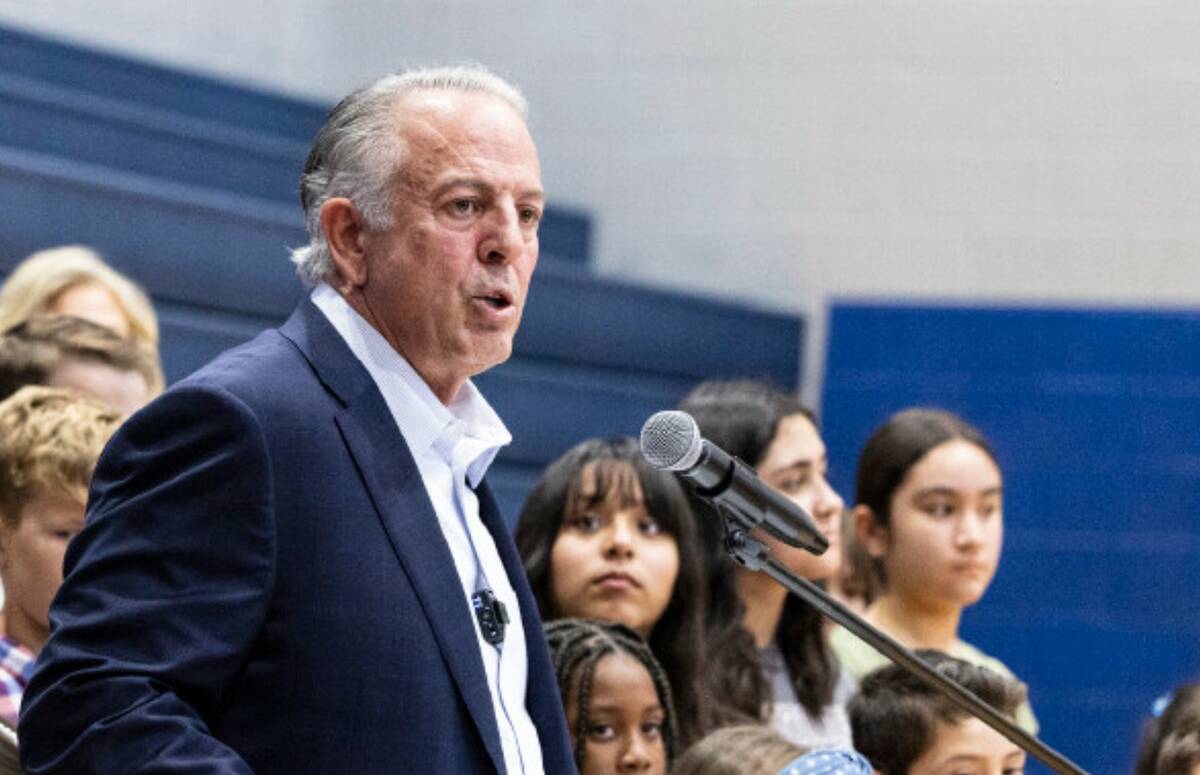Legislators reject Lombardo’s Opportunity Scholarship funding plan

After an approximately 12-hour hearing Wednesday, the Nevada Interim Finance Committee rejected on party lines Gov. Joe Lombardo’s proposal to use federal COVID-19 funds to finance Opportunity Scholarships.
Lombardo last month proposed using approximately $3.24 million of unallocated federal COVID-19 funds to cover the need-based scholarships for students to use for private schools. The Governor’s Finance Office submitted the proposal to the Legislature’s Interim Finance Committee, a 22-member majority-Democrat committee.
“My administration grieves with the hundreds of students who will be crushed by Democrats removing them from their friends, teachers, and schools, and my administration remains more committed than ever to fighting for all Nevada students,” Lombardo said in a statement. “Our fight continues.”
The proposal came as an alternative after the Nevada Legislature passed Lombardo’s education bill without the portion to fund and expand Opportunity Scholarships.
At least 350 students are at risk of losing their Opportunity Scholarships and getting kicked out of their schools in the coming weeks, Lombardo’s Chief of Staff Ben Kieckhefer said Wednesday afternoon. Lombardo’s program would ensure students who received Opportunity Scholarships last year are not forced out of their current schools, he said.
But Democrats argued that the reason why some organizations don’t have adequate funding is because one of the six scholarship organizations took the bulk of the money allotted every year as part of the Educational Choice Scholarship Program, which started in 2015.
“We as a legislative body are not pulling the rug from under the students,” said Chairwoman Daniele Monroe-Moreno, D-North Las Vegas.
A ‘manufactured crisis’
There is a statute with the exact amount of tax credits that go into the scholarship program, Monroe-Moreno said, and one organization — the AAA Scholarship Foundation — took the money and has about $13 million in reserves, which is distributed on a first-come, first-serve basis.
After much back-and-forth, Denise Lasher, a representative for the AAA Scholarship Foundation, said it will work with the other organizations to let them know when it opens up applications for returning students.
Democratic committee members questioned why the issue wasn’t brought up during the legislative session, how the organizations disperse the funds and what plans there are for sustainable funding in the future. They argued there was a lack of accountability and transparency with how the organizations handle the scholarships, and asked representatives from the organizations about fundraising efforts and how they work together to transfer left over money to another organization who needs it.
Some Democratic legislators asked if the problem was real, arguing there are enough dollars in the program.
Sen. Rochelle Nguyen, D-Las Vegas, called it a “manufactured crisis” that was created to expand the program.
“This doesn’t appear like a lack of funding. There is money there,” she said.
Representatives of the scholarship organizations spoke about a scarcity of resources and uncertainty where future funds will come from. Dana Stern, administrator for Silver State Scholarships, confirmed her organization had to tell about 350 students that there is no money for them and that they will have to go back to public school.
“We’re small organizations trying to make a difference in the community,” said Rabbi Nachum Meth with Student Choice Fund of Nevada. “We’re trying to help kids and help students.”
The average household income of the families who received scholarships from the organizations in the 2022 to 2023 school year are between $34,000 to $66,000, and the average scholarship amounts are between $1,000 and $7,500, according to the Educational Choice Scholarship Program Report.
Republican legislators opposed Democrats’ motion to reject Lombardo’s proposal.
“There’s definitely some obvious deficiencies in opportunity scholarships,” said Assemblyman Gregory Koenig. “But that being said, I just thought it was never a go to begin with from the party in charge.”
‘Public schools … doesn’t work for all’
More than 50 people spoke during public comment, many of whom were parents and students advocating for opportunity scholarships.
Karla Severson, a mother of three and an immigrant from the Philippines, said she understands the value of education as a gateway to success, and that Opportunity Scholarships represent a “lifeline” to children.
“My own journey in this great country has been shaped by the quality education that I received,” she said. “I firmly believe that every child regardless of their background, should have access to the same opportunities that I had.”
Some who spoke in opposition felt public funds should not go toward private organizations but public ones instead.
Tom Wellman, a member of the Nevada State Education Association who worked for 32 years in the Clark County School District as a teacher and school counselor, said this plan would throw away money in order to fulfill Lombardo’s campaign promise.
“Supporting this issue will only benefit a very small number of students in Clark and Washoe County,” Wellman said. “Let’s do what’s right for the students in Nevada and put this money where it belongs: in public education.”
Those in support rebutted that the proposal will not defund public schools, pointing to Lombardo’s signing of a $12 billion bill to fund public education. They argued it will lessen the burden on a strained public school system.
“This is not a knock on public schools,” said Rabbi Shea Harlig, who spoke in support. “Public schools work for many but it doesn’t work for all.”